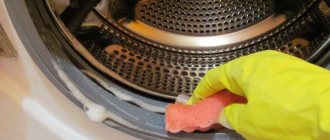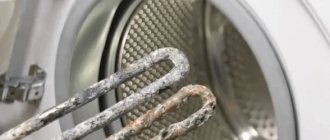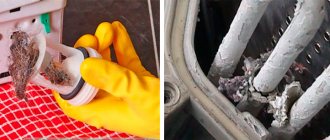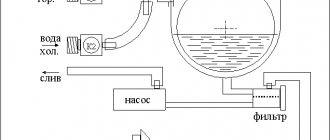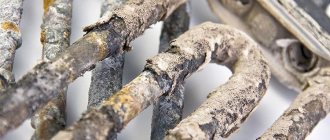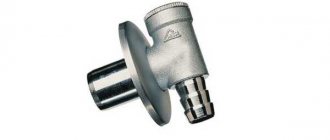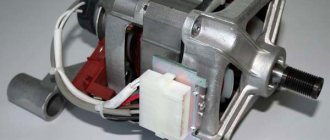Why and how does odor occur in the washing machine?
Many people are interested in how to clean an automatic washing machine from smells? Why does the washing machine start to smell rotten and rotten if we do everything the same, use the same powder and don’t change anything? How to get rid of an unpleasant odor? It is important to understand the reasons. It turns out that when caring for the washing machine, we often make traditional mistakes that lead to the appearance of an unpleasant odor. The causes of unpleasant odor from an automatic washing machine are staphylococci, molds and E. coli. A rotten smell appears when entire colonies of bacteria form in the unit. In order for them to reproduce, they require moisture and warmth. The washing machine is the ideal place for this. Housewives do a lot of things wrong:
- Close the door. If you leave the loading hatch closed after finishing the wash, bacteria will begin to form inside, as an ideal environment will be created for their development.
- We strive to save energy. When we wash at low temperatures, microorganisms are not destroyed. Requires heating to 90 degrees. Favorite washing modes at 30 or 40 degrees become favorable for the development of entire colonies.
- We use low quality powder. The same can be said about the rinse aid. If the product is bad, it does not dissolve completely in water. Particles remain on the filters, drum and other parts of the machine. Such plaque is an ideal environment for the development of bacteria.
- We do not follow the dosages indicated on the packages. Manufacturers specifically prescribe the required amounts of detergents. Using more quantity does not guarantee quality. Excess remains on all elements, powder tray, filters, hoses and other parts of the unit. They are also not rinsed completely, so the laundry turns an unsightly gray color.
- We don't check the pockets. Leftover food, crumbs, candy and pieces of paper, as well as other debris, become soaked and settle on the hoses and filters.
- Wash with too hard water. The water contains salts and particles of organic origin, which are deposited on the heating element. Gradually, the carbon begins to break off and form a sediment. This becomes a favorable environment for the development of entire colonies of harmful microorganisms.
- We install the washing machine unevenly. If the device is tilted, the water does not drain completely into the sewer. Partially it remains and begins to rot.
- We do not regularly clean the filter. During the draining process, hair and large debris remain on the filter. They then decompose and lead to a foul odor.
- We do not rinse the bath, which is intended for detergents. A slimy coating appears, which favors the development of mold and other abominations.
- After completing the wash, do not wipe the drum. There is water left in it. Gradually it begins to fade and stink.
- Do not wash the rubber cuff that is provided on the loading hatch. This is how a lot of garbage accumulates.
- We store dirty laundry in the drum. Bacteria begin to multiply and produce an unpleasant odor.
- We do not trust installation to experienced specialists. It is likely that the drain hose is not connected correctly to the sewer. The drain hole should be located at a maximum height of 50 cm from the floor. The hose is fastened in the shape of the letter U. Otherwise, an unpleasant odor will appear.
Removing the smell from the washing machine will be a priority task that will have to be resolved quickly. If you find out the reason, you can quickly eliminate this problem.
Prevention
Preventing odor problems is much better than fighting them. To prevent the machine from emitting foul odors and to serve for a long time without interruptions or breakdowns, you need to adhere to preventive measures:
- If water is detected after washing, then you should contact a technician to check the operation of the drain pump.
- It is better to use regular washing powders. It is better to avoid liquid conditioners, as they lead to the formation of fungi.
- To reduce scale formation, it is better to use filtered water for washing. Purchasing a filter is a good way to improve the performance of equipment.
- Drain hoses need to be replaced periodically.
- Before washing, you should thoroughly clean the pockets of small debris, crumbs, and dirt.
- At least once a week you need to wash your clothes at maximum temperatures.
- Heating elements should be cleaned periodically. To improve their performance, you can use emollients.
- Once every 2 months you should wash it “dry” using bleach.
- For washing you need to use as much powder as indicated in the instructions.
- The drain filter must be cleaned several times a month.
- There is no need to slam the machine door immediately after washing. It should take at least a day for the inside of the equipment to dry.
- There is no need to store dirty laundry in the washing machine. It is better to use specialized baskets for this.
Once you get rid of unpleasant odors, don’t forget about prevention. Careful operation of household appliances will extend their service life and save a considerable amount of money.
Step-by-step cleaning tips - video:
Once you get rid of unpleasant odors, don’t forget about prevention. Careful operation of household appliances will extend their service life and save a considerable amount of money.
Special products for getting rid of odors in the machine
If there is a sewer smell coming from your washing machine, you can use special preparations to effectively eliminate the nasty aroma. Most often we trust advertising in choosing this or that product, but here we should be very careful. Here are our recommendations:
- Calgon is a highly advertised product, but it is absolutely not effective.
- Antiscale is a good, proven product available from many manufacturers. Among the minuses, it is worth noting the possible clogging of the drain hose from cleared scale.
- Special cleaners, such as Dr. Beckmann - very good, according to reviews, for getting rid of scale and dirt.
Before using the drugs, it is important to carefully study the attached instructions. Do not use multiple cleaners at the same time. Work must be performed wearing a respirator and gloves.
How to remove dirt from the drain filter
During long-term use, fabric fibers, hair, wool, paper accidentally caught in pockets, etc. gradually accumulate in the filter. As it accumulates, it retains some of the moisture even after the washing process has stopped. Under the influence of heat and moisture, these cleaning products begin to decompose and bacteria grow in them.
As a result, we feel the rotten smell coming from the washing machine, like a clogged sewer. To eliminate the unpleasant smell from the washing machine, we first get rid of the accumulated garbage.
If you are confident enough in handling household appliances, you can do this yourself, using the instructions in the technical passport of your machine. Unscrew the plug with the filter and remove any debris that has accumulated there.
Then wash the filter with detergent and reassemble after that. Or you can entrust a specialist to clean the washing machine, eliminating this cause of the smell.
Dishwasher tablets
Another good way is dishwasher tablets. Cleaning your washing machine from smells will be a real pleasure. Today, products have been developed that easily remove plaque and grease from dishes, help disinfect and eliminate unpleasant odors. They can easily cope with identical problems in the washing machine. You need to take five tablets and put them in the drum. After this, the wash starts at high temperature. Next, do the rinsing. It is important to thoroughly wipe all accessible parts dry. This method is suitable when the pollution is not so strong. You can also carry out monthly prevention with home remedies.
Sources of unpleasant amber
First of all, you need to find out why the washing machine stinks and find the source of the accumulation of “odors.” The causes of a putrid, musty, moldy odor are bacteria, fungi, and mold. Representatives of the microcosm feel great in a warm, humid, dark environment, which is the washing machine.
Microorganisms can settle not only in the centrifuge, but also in the internal parts of the mechanism, drains, and hoses. Any place that comes into contact with moisture is a potential environment for the development of organisms. To detect and eliminate settlements of bacteria and fungi, you should know their habitats, as well as follow simple rules for operating a washing machine.
Our mistakes
Often the cause of an unpleasant odor is the incorrect actions or inaction of the housewife. If a musty smell comes from the washing machine just a few months after purchase, it means that the owner is not aware of the operating rules or is being negligent in relation to the equipment. By analyzing your actions while using the machine, you can eliminate the unpleasant odor factor to keep the equipment clean. What are housewives doing wrong? Typical errors are described in the table.
Table - Erroneous actions when operating washing equipment
| Action | Description | Problem |
| Closing the hatch | — Door slamming immediately after removing washed items | — Retention of moisture on the surface of the centrifuge due to its incomplete evaporation; — the emergence of a “greenhouse effect”; - favorable environment for the development of fungi and bacteria |
| Storing dirty laundry | — Loading a wet drum with dirty laundry, leaving things inside for a long time | — Creating an environment for microorganisms to thrive |
| Wash at low temperatures | — Using only one mode with a set temperature below 40°C | — Incomplete dissolution of the powder, poor leaching from clothes; — the appearance in the inside of the machine (on the drum, hoses, filters) of powder “spots” on which bacteria settle; — creating an environment for the proliferation of microorganisms that low temperatures do not kill |
| Wash at high temperatures | — Using only one mode with a set temperature above 60°C | — Accumulation of plaque during frequent washing at high temperatures (above 60°C); - the appearance of a burning smell, which is emitted by large deposits when the machine is operating at high temperatures |
| Use of low-grade powders | — Buying cheap powder and rinse aids without special additives that protect against scale | — Poor dissolution of cheap powder products; — accumulation of soap residues inside the hoses; - formation of plaque or scale on surfaces, inside the drum, hoses |
| Negligence when loading clothes | — No checking of pockets before loading into drum | — Rendering of various items not taken out of pockets into disrepair (including passports and money); — breakdown of equipment due to clogged filters and tubes; - the appearance of a putrid odor when small debris (napkins, cigarettes, sweets) settles in the internal parts |
| Ignoring filter cleaning | — Lack of periodic washing of the drain and inlet filters, which are responsible for preventing odor and preventing breakdowns | — Retention and accumulation of large particles in clogged filters - hair, dust, debris; - appearance of an unpleasant odor |
| Using hard water | — Reluctance to use special products for water softening, cleaning hoses, drain holes | — Formation of plaque on a tubular electric heater (TEH); — the appearance of scale due to the deposition of salts from the central water supply, the adhesion of fluff; — formation of plaque from residual detergents and small debris; - settling of a large amount of dirt |
| Leaving the centrifuge wet | — Reluctance to wipe the rubber lining and tray dry, or to rinse the powder receptacle | — Germination of mold and mildew due to constant humidity |
Favorite places for bacteria
To eliminate unpleasant odors in your washing machine, you should know the places where the smell comes from. Bacteria, fungi, and mold actively multiply in certain parts of the machine. Usually these are hard-to-reach places, folds, narrow crevices. When checking and cleaning equipment, you should pay attention to the “favorite” places of microorganisms:
- receptacle for laundry detergents (pull-out trays);
- a channel behind the receiver, providing access to the powder and conditioner inside;
- rubber lining around the door;
- filters - for water inlet and outlet;
- drain hose;
- heating tube.
Almost all parts of the machine can be checked at home yourself, without resorting to special tools or calling a specialist. The tray can be easily removed by pressing a special blue valve and washed with cleaning agents and water. The channel can be clearly seen with a flashlight and can be cleaned with a small brush. The sealed pad and centrifuge are always accessible. The filters are removed, cleaned, and then put back in.
Vinegar
If you don’t know how to remove the smell from your washing machine, know that you can use home remedies if you wish. Regular vinegar is especially often used, which effectively eliminates unpleasant odors. Now it's so easy to clean your washing machine from musty smells. It will be possible to dissolve lime deposits on the heating elements. In combination with hot water, the composition can easily cope with mold and bacteria. Cleaning with vinegar is allowed once every six months. Acid can damage machine parts made of rubber.
Eliminating odor in an automatic washing machine begins by taking a glass of acid and pouring it into the powder tray. After this, the mode is set in which the laundry is usually boiled. The temperature should be 90 degrees. When the main wash stage is completed, you need to pause. The unit is left in this state for a couple of hours. Then the machine is started again in rinse mode. You must wait until the program completes. It is necessary to unscrew the pump filter to drain. There may remain pieces of soot that have broken off. Finally, an additional rinse is started. Vinegar is also used instead of rinse aid. Three tablespoons of acetic acid are poured into the compartment intended for rinsing. This will prevent the smell of rot. If you use apple cider vinegar, your laundry will have a pleasant aroma.
Causes of odor
The causes of odor can be divided into two groups. The first is associated with the most common problems, most often caused by violations of the operating rules of the device. The second includes hidden reasons; they are not so obvious and are less common.
Obvious
After installing the washing machine, you must carefully read the instruction manual and follow all its points. Then the causes of the odor will be eliminated:
- due to a closed hatch;
- contamination of sealing rubber;
- storing dirty things inside the drum;
- installing the device on an uneven surface;
- exceeding the amount of powder supplied to the container.
You need to follow the instructions to avoid such problems.
Hidden
It is not always possible to understand that the smell from the washing machine is caused by the following reasons:
- poor choice of powder;
- contamination of the surface of the tray and channel for supplying powder;
- clogging of the filter with large objects, which can even completely block the drainage of water;
- incorrect connection of the device to sewer pipes;
- the need to clean a silted drain hose;
- adhesion of a layer of scale mixed with dirt and debris on the heating element;
- The problem is in the general drainage system.
Sometimes finding out the source of an unpleasant odor requires the help of a professional.
Lemon acid
Citric acid will help remove odors from your washing machine. Cleaning your car with citric acid is allowed every four months. 100 g of acid must be poured into the powder tray. After this, select a program that guarantees maximum water heating. After this, an additional rinse is required. Finally, the cuff and drum should be thoroughly wiped. We leave the door open. If washing is performed frequently, it is possible to carry out this procedure for prevention every month or two. But in this case you need to take a maximum of two tablespoons of acid.
What can I do to stop the smell in my washing machine?
If you don't want to clean your car too often, try preventing odors. There are several ways Why Your Washing Machine Smells - And How To Clean It to do this.
Choose the right washing powder
Let's repeat: front-loading machines can't handle large amounts of foam. Select an automatic washing powder and read the instructions for it. Manufacturers usually indicate how much detergent is needed per cycle.
Keep the drum dry
A closed and damp machine is an ideal environment for bacteria to grow. Therefore, immediately after washing you need to take out the laundry. Keep the drum and powder tray open. This way the equipment will dry faster. If possible, install a fan or dehumidifier in the room.
Clean the rubber cuff regularly
The right powder does not guarantee that the seal will not have deposits that cause mold to appear. Therefore, after each wash, you need to remove any stuck debris from the folds of the cuff, and then wipe the rubber with a dry cloth. Once a month you can use a solution of vinegar and water.
Baking soda
Another option to remove unpleasant odors from your washing machine is baking soda. This will get rid of mold inside the unit. You will also be able to forget about fungal plaque. You don't have to think about why your washing machine smells bad. You just need to take a glass of water and a glass of soda. The solution is applied to all affected parts. Another glass of sodium bicarbonate is poured instead of powder. After this, boiling is started, as well as additional rinsing. Copper sulfate can be a substitute for meat. To do this, take a liter of water and dilute 30 g of vitriol in it. Available parts are processed, and the remainder is poured into the drum. After this, the wash is started, at which the water heats up to 90 degrees.
Reasons for the accumulation and development of microorganisms
The most common and common operating mistake is closing the hatch (horizontal loading) or the lid (vertical loading) immediately after washing. The machine needs time to evaporate moisture, so leave it open after use for at least 2-3 hours.
The second mistake is storing used clothes in a drum. High humidity plus dirty laundry is a breeding ground for the life of microorganisms.
It is recommended to store stale clothes in a special basket. It does not take up much space, and fungi and bacteria have less chance.
Wipe the drum and sealing rubber inside and outside with a dry cloth after each use of the machine so as not to create favorable conditions for the development of bacteria and fungi
They create a convenient platform for the development of microorganisms and some detergents. If they are of poor quality or used in excess, this will lead to the formation of mold in the washing machine.
Washing at low temperatures also contributes to the appearance of a foul odor.
Chlorine-containing products
Chlorine will help remove odors from your washing machine. Using chlorine-containing compounds is very convenient to get rid of unpleasant odors. At the same time, they additionally disinfect. You can take any chlorine-based product. An example is whiteness. You should take 100 g and pour it into the compartment intended for powder. After this, the boiling program starts. An additional rinse is required. The drum and cuff are wiped after use so that the chlorine does not “eat” the rubber. The door is not closed. It is necessary to ventilate the room well after cleaning. You can also wash your washing machine to remove the rotten smell.
Professional products
There are cases that no folk remedy can cope with. Then you should turn to special household chemicals. The treatment must be carried out in accordance with the instructions, using a high temperature mode and a subsequent washing cycle with additional rinsing:
- Calgon. Protects the drum, as well as the electric heater of the washing machine, from plaque and scale, while softening the water.
- Master Glitter. Chistolan Automatic. Same composition and application as the previous product. The housewives assure that the result is the same, and the price of Chistolan is much lower.
- Tiret. It will help not only remove unpleasant odors, but also clean the washing machine from any type of deposit. A bottle containing 250 ml of cleaning agent is designed for one use.
- Doctor Ten. Removes scale and kills all dangerous bacteria, eliminating bad odors.
- Chistin effect 2 in 1. The manufacturer assures that the product will extend the life of the washing machine. It removes scale and prevents its reappearance.
- Refine. Probably one of the most budget-friendly products in the line of products for washing machines. Users note that the product is no worse than other expensive well-known ones. Used for active descaling.
How to prevent odor in your washing machine
Many people worry that if their washing machine smells rotten, what should they do? It is worth trying to avoid problems rather than solve them. If you don’t want to constantly think about why your washing machine smells like rotten water, you should follow these simple recommendations:
- To avoid smell from the washing machine during washing, do not leave laundry in the unit: washed or dirty.
- The unit must be thoroughly ventilated after each wash. Otherwise, there will be a damp smell in the washing machine.
- Preventive measures should be carried out regularly to eliminate scale and fungus. For example, you can wash your washing machine to remove odors.
- If you need to wash things that are stained with gasoline and other caustic substances, you should first rinse the clothes and only then wash them. Otherwise, you will have to wonder why your washing machine smells rotten. It is important to purchase high-quality powders and gels. You should not buy goods of dubious quality.
- It is good to wash things at high temperatures. With regular cold washing, mildew will inevitably appear and a musty smell will appear in the washing machine.
- If problems are noticed in the operation of the unit, you should immediately contact professionals with solid experience. The technician will be able to find out why the smell appeared from the washing machine drum. He will quickly solve this problem.
Now you know how to get rid of the smell in your washing machine. If you follow certain rules and regularly clean your machine, you can significantly extend its service life. If there is an unpleasant odor in your washing machine, act quickly. Write about what tools helped you in the comments!
How to remove odor from a washing machine
There are many ways to eliminate odor. But first, visible contaminants must be cleaned:
- wash the tray with warm soapy water using a toothbrush;
- The channel for supplying washing powder is cleaned with a special brush;
- accumulated debris is removed from the drain filter and then washed under high water pressure;
- The outer part and the recesses of the sealing collar are cleaned with a rag soaked in a soap solution;
- The drain hose is first disconnected to be cleaned with a brush.
After mechanical cleaning of the tray and rubber, a washing program is started using cleaning agents, but without laundry.
Idle cycle at high temperature
A cycle without laundry at 95 degrees will help remove odor from the washing machine. To start the operation you need:
- pour the selected cleaning agent into the tray;
- turn on the high-temperature wash program without loading laundry.
A temperature close to boiling will destroy the colonies of microorganisms that have inhabited the internal components of the machine.
Folk remedies
Good results are obtained by dry washing using folk remedies. They are safe for the mechanisms of the unit if the instructions are followed. Treatment should be done no more than once every 3-4 months.
Vinegar
The acid quickly eliminates odor and easily destroys scale on the heating element and deposits inside the hose. It does not have a negative impact on the operation of mechanisms. There are different ways to remove odors from your washing machine.
Method number 1:
- pour 0.5 cups of table vinegar into the tray;
- turn on a 3-hour program at 60-90 degrees, but stop it after a few minutes for 1-1.5 hours;
- during this time, the acid will destroy all deposits;
- turn on the program again;
- After stopping the machine, clean the filter.
Method number 2:
- mix 0.5 liters of water and 1 tbsp. l. vinegar;
- use a cloth soaked in a dilute acid solution to treat all parts;
- run a quick wash without laundry and powder.
Care must be taken when treating rubber elements with vinegar. You need to complete the cleaning by running the quick rinse mode.
Lemon acid
Citric acid helps descale the internal parts of the machine. Its advantages are accessibility, no harm to the device with high efficiency.
You will need from 60 to 100 g of citric acid, depending on the volume of the unit:
- crystalline powder is poured into the tray;
- start the mode at 60 degrees, but without loading laundry;
- After completing the procedure, thoroughly rinse the compartment with a double rinse and leave the machine open to dry.
There are concerns that the acid will destroy the metal element of the heating element. However, a low concentration solution is used for cleaning, which is completely washed out at the end of the wash. Therefore, food grade citric acid is completely safe for all mechanisms.
Soda
You can get rid of the smell in your washing machine using baking soda - a simple remedy that is widely used in the household. It is enough to pour 0.5 cups into the tray and turn on a single wash at high temperature with rinsing.
To treat nodes affected by fungus, sodium bicarbonate is mixed with water in a 1:1 ratio. The gruel is applied to areas covered with a black coating. After 30-40 minutes, wipe with a sponge and rinse, turning on the rinse program.
How to eliminate odor from an automatic machine using household chemicals
There are many chemical products on sale that successfully deal with dirt and mold. But they should be used with caution - some substances are too aggressive.
Soda Ash
Unlike baking soda, soda ash is characterized by a higher alkali content. It dissolves grease and scale well. The product is often used to bleach cotton and linen items.
To get rid of the smell in the washing machine, you need to pour 4 tbsp into the tray. l. soda ash and run a high-temperature wash without laundry with a rinse function. At the same time, the hot solution will also clean out mucous deposits in the sewer pipes.
Products with chlorine
Bleach is the most accessible chlorine-based product that is widely used for disinfection and cleaning. Housewives note its effectiveness against scale and mold.
However, it can only be used if the instructions for the machine do not prohibit its use. Bleach is useful if you need to clear the drain filter of clogs and odors.
Oxygen-containing bleaches
Instead of chlorine, it is better to use oxygen-containing bleaches - Vanish, Dr. Beckman and others. They also clean the car well of scale and dirt. In addition, the products have a disinfecting effect, but are more gentle on the device parts. Using them regularly when washing cotton towels can help get rid of mildew caused by mildew.
Copper sulfate
The smell from an automatic washing machine can be removed with copper sulfate by wiping all places where fungus is suspected. Experts recommend adding 30-40 g of reagent to prepare a solution per 1 liter of water. After treating with this composition, leave the machine for a day, and then set up the idle wash function and wash off all traces of the chemical.
To disinfect the unit, 50 g of copper sulfate is dissolved in a small volume of water and poured into a tray. The quick wash mode washes the machine.
Antiscale
Antiscale tablets contain acids that dissolve salt deposits on heating elements well. However, when using them, you must strictly follow the dosage and instructions. Acidic fumes can also enter the surrounding area, so it is better to carry out cleaning with the windows open.
Reviews of folk methods and chemicals confirm their effectiveness:
Maria: The car smelled really bad inside. It turned out that fungus had grown in the o-ring. I wiped it with copper sulfate, then with a clean rag, the smell disappeared.
Yulia: Due to the fact that there was a mucous deposit in the drain hose, there was a strong unpleasant odor. I had to remove the hose and wash it with bleach, it helped.
Prevention of bad odors
Cleaning a vending machine from dirt and odors that are deeply ingrained is not always easy. To ensure that your equipment lasts longer and does not cause problems, you need to adhere to the following recommendations:
- Keep the hatch door open after washing for 1-2 days to allow all parts to dry.
- Do not leave dirty items in the drum. To do this, it is better to use a ventilated basket.
- After completing the wash cycle, you need to check the hatch for debris and wipe the elastic band with a cloth.
- Do not use cheap detergents of questionable quality.
- Pour the prescribed amount of powder into the tray.
- Regularly invite a specialist for preventive examination.
- Constantly check that the unit is level.
- After each cycle, wipe the hatch with a dry cloth.
- Clean pockets well before loading.
If you regularly care for your washing machine, you won’t have to rid the machine of the smell.


